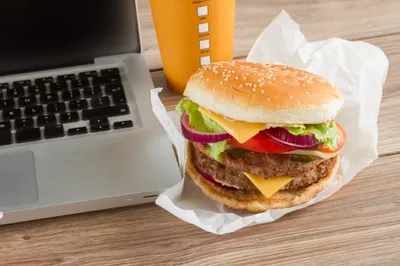Regardless of whether you have a sweet tooth, a temptation for starches, lack of will power in the face of saturated fats, or all of the above, we’re all familiar with food guilt in one way or another. Food guilt is the shameful string of emotions and negative self-talk that follows an indulgent snack, sweet dessert, or rich meal.
If you obsess about what you should or shouldn’t be eating, it’s time to banish food guilt for good…
1. Identify Sources of Food Guilt
As babies and even children we don’t associate eating with shame and negativity. Something caused this negative association to occur. It might have been a sibling calling you overweight as a child or magazines full of scantily clad, unrealistic body types. Recognizing this source of food guilt will help you overcome negativity and create new and positive associations with food.
2. Confront Toxic External Messages
In many cases, you may be affected by external sources of food guilt. For instance, if a parent constantly followed you around as a teen saying, “You’ll gain weight if you eat that hotdog” you’ll undoubtedly begin to associate hot dogs as a “bad” food. So aim to place distance (or ignore) between you and this sort of judgment by confronting your parent with their negative judgment.
3. Good vs. Bad Foods
Food is fuel. And unless it’s crawling with worms or bacteria there is no such thing as fundamentally “bad” food vs. fundamentally “good” food. Sure, you may want to avoid eating chocolate bars for dinner every night, but you’d also lack the proper nutrients if you ate carrots (considered in many eyes a “good” food) for dinner every night as well. The key is a balanced diet incorporating all food groups—fats, proteins, carbohydrates, and sugars. So you can still realistically enjoy a small serving of chocolate, in moderation and without guilt attached.
4. Aim for Food Inclusion Not Food Restriction
A lot of stress is created around what we eat. And those with food guilt may suffer anxiety around eating because they feel pressured to eat only “good” foods. So instead of counting calories or banishing carbohydrates from your plate, aim for variety in your meals in the form of color, food groups, or ingredients. This will help you make positive decisions about food every day rather than place negative restrictions on your meals.
5. Learn Food Understanding
I almost typed “Learn Food Forgiveness” above, but forgiveness insinuates a wrongdoing, which is often attached to a food overindulgence. No, instead of punishing yourself for a food choice, aim to understand your food choices compassionately. It’s totally fine to splurge on a new pair of shoes, a new blouse, and a cupcake once in a while, no pardon necessary.
6. Learn to Identify and Confront Food Triggers
Punishing yourself after binge eating won’t do you any good. In fact, it creates a dangerous cycle of overindulgence and self-abuse. Instead, a healthier way to approach a food binge is to look at what triggered your binge. For instance, are you stressed at work, financially, or in a personal relationship? Sometimes we use eating as a form of control or as a coping mechanism instead of dealing with the actual stressor head on.
7. Learn a Little Self-Love
Food guilt may begin with a judgmental parent or from unrealistic societal beliefs. However, food guilt fosters and grows internally. It’s an unhealthy conversation that we have with ourselves over our food choices. So if you have an extra cookie, banish the negative, shameful self talk, you are not a bad person, you are human.
8. Indulge Every Once in a While
It’s unrealistic to live your life without ever enjoying your favorite foods again. I know that I can’t live without chocolate peanut butter cups, and if I tried to I’d end up binging on an entire bag. Instead, I indulge in a cup every once in a while. It’s my right, I’ve earned it. However, I don’t keep a whole bag in the house or I would scarf the entire lot on a bad day. Relishing a bit of my favorite treat once every few weeks, reserves it as my special indulgence.











